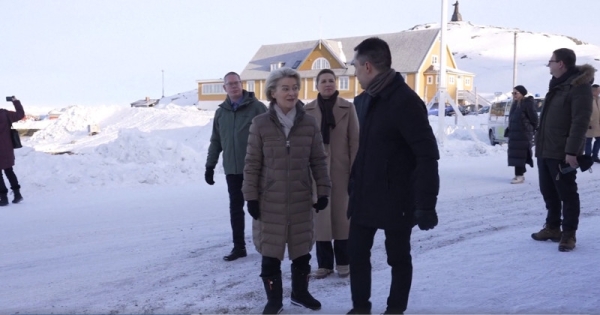Von der Leyen courts Greenland for raw materials
The EU opened its first Arctic Office in Nuuk, the capital of Greenland, on Friday (15 March).
"This office is more than bricks and mortar. This is the beginning of a new era of partnership," said EU Commission president Ursula von der Leyen, who had travelled to Greenland to win the island’s favour over other major powers also vying for its mineral wealth.
While not technically a part of the EU, the Danish territory is becoming increasingly vital to the bloc as global warming and melting ice reveal the vast mineral wealth trapped beneath.
The EU Commission believes Greenland has 25 of the 34 raw materials it needs, including lithium, niobium, and zirconium used in batteries, magnets, and metal alloys.
In December, the EU and Greenland signed a strategic partnership on sustainable raw materials value chains.
This week’s visit, which included Mette Frederiksen, the Danish prime minister, was meant to bring Greenland even closer with two more agreements, bucket loads of charm and the promise of future profits.
Charm, profit and democracy
One initiative extended an existing fund aimed at enhancing local education and retraining workers, totalling €71m, while another focused on a €22m investment deal in green energy.
"Greenland is the home of critical minerals, and Europe needs what you have," said Frederiksen, not beating around the bush. "So we all hope for a closer relationship on that as well — to the benefit of us both, of course."
But there are other interested parties besides Europe. Former US president Donald Trump offered to buy the island in 2019, which he described as a "large real estate deal."
China has also attempted to draw the island into its sphere of influence by offering investment proposals for mines, roads, and airports. But despite the apparent enthusiasm from governments, only two mines are operating on the world’s largest island today.
This is partly due to Greenland’s remote location — technically part of the North American continent — which makes the cost of transport and mining is prohibitively high. And local communities are concerned that large-scale mining could disturb their way of life or result in environmental harm, which has made the topic politically controversial.
So von der Leyen and Frederiksen aimed to allay concerns and draw Greenland closer by pledging to protect the environment and invoking a shared democratic culture.
"From the very first moment, it felt like home, and I think it is because we are so like-minded," said von der Leyen, who had just arrived in Greenland. "Our interest is to join forces as democracies and like-minded partners."
"For us, it is important to give the best offer to our partners in Greenland, which is transparency and full respect for the environment," she assured Greenland’s prime minister, Múte Bourup Egede, standing beside her.
"Others do the mining here, then take the processing to their own country," she said, in an implicit dig at China.
"We do not want to partner just to extract minerals; we want to add high-value activities and build processing and refining here," she added.
While mindful not to offend his high-profile guests, Egede made sure to keep the door open for other potential parties. "Everybody in the world needs to invest in the green transition," he said. "Last year we had a near-record amount of mining explorations. So clearly there is interest."
Autonomy
Greenland has been under Danish sovereignty since 1721 and has inched towards more autonomy in recent decades. In 2009, the island gained a measure of self-rule, including control of its mineral resources.
Denmark is still responsible for foreign policy, defence, and security. But this is slowly shifting.
In April 2023, a draft constitution was unveiled. In a policy document published in February, the island governing body outlined its foreign, defence and trade strategy.
The Naalakkersuisut, the Island’s chief executive body, wants closer ties to the Arctic parts of North America and has proposed establishing a new political forum called the Arctic North American Forum, where Greenland would represent itself.
The text acknowledges its neighbour, the US, as the "world’s leading superpower", signalling a soft alignment with Western powers.
However, Greenland also recently opened its own representation in Beijing in an effort to enhance relations with China and has been careful not to overly incite Russia, mentioning the country only once in its strategy.
By "enhancing its collaboration" with other powers and "eliminating trade barriers," Greenland officials aim to position Greenland as a safe space to prevent a military escalation in their backyard.
"Basically, we want to avoid an arms race in the Arctic," said Vivian Motzfeldt, Naalakkersuisut for Independence and Foreign Affairs, in a statement. "We will, therefore, cooperate more with our allies."
"The starting point for that and for manoeuvring more safely in the Arctic is to involve the Arctic populations, to involve us," she added.

